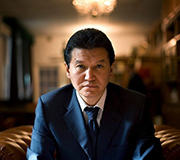Six years later, while attending the University of Melbourne, Stewart produced the world's first map that depicted everything from the perspective of a person from the southern hemisphere. This happened in 1979 on Australia Day. Since then, around 350,000 of these maps have been sold around the world. This is how, albeit in jest, the world was changed, that is, turned upside down.
So, “Day of the Upside-Down-World” is an excellent occasion not only to laugh at some (sometimes very outdated) ways and traditions, but also to seriously think about how true our modern ideas about what is right and what is wrong are. Maybe the “inverted world” will soon seem to us much more multifaceted and more interesting than the one in which we are used to live?
Surprisingly, people who have learned to fly like a bird in the sky, swim like a fish under water, have not learned how to coexist in peace on earth. Perhaps, as we develop technology, we are constantly missing something more important, something that makes us truly human beings? Something unchanging, existing regardless of the time and degree of scientific progress, universal human values: love, compassion, respect for all living beings and for all varieties of life. This is what our fast-paced and restless world and we ourselves need most of all today.
We are so carried away by digital technologies that we are ready to digitize the man himself, and his consciousness. Scientists started quite seriously talking about the "transmigration of consciousness" as a form of immortality. Like, there is no difference - where and how to exist, in the electronic or physical world, in a computer or a new body. But what about the fact that a man is a particle of God? What about this, gentlemen scientists? Will you digitize your soul?
Naturally, scientific progress cannot be stopped, and the desire of some scientists to engage in the "improvement" of man is quite understandable. Over the past two decades, private laboratory research has grown into a rapidly expanding industry. But still, you can “print” a new heart on a 3D printer, but it wouldn’t teach you how to “feel with your heart”.
Reflecting on all these "scientific achievements", at some point I thought what kind of world do we live in today? Every year, society is moving further and further away from spiritual values that were considered common to all mankind. The latest technology, material goods and entertainment are becoming more and more important. The era of consumerism, temptations and excesses does not make us more moral, and sometimes, on the contrary, creates, with external well-being, an internal emptiness. Sometimes seditious thoughts come to mind: maybe this soulless progress is a terrible trap for humanity?
According to the Dalai Lama, we can plunge into a moral crisis, which is more terrible than an economic crisis. His Holiness notes that even religions are becoming a pretext for conflict today, and the division of people into "us" and "them" only fuels the separation. “Our world has become deeply interdependent,” says the Dalai Lama. “Before, we only cared about our family and our country, but now it's time to think about the interests of the whole world and all its inhabitants.”
Probably, everyone remembers the pictures showing a man standing at the top of a pyramid (or stairs) with the caption: “man is the crown of nature.” Modern man, as it were, looks down on everything, considering himself the crown of creation and the pinnacle of evolution. However, it is possible that we are already paying for such conceit by being defenceless against a microscopic virus.
It feels like our life is becoming a continuous struggle and race. We rush, hurry, hustle, and fill the world with useless things and new weapons. Maybe it's time to turn this world leading us to catastrophe upside down, and plunge headlong into the boundless blue of the sky and fill ourselves not with worries and the desire to do everything in time, overtake everyone, but with just sunshine? Maybe it’s better not to bully a neighbour and spit on his porch, but to treat sick children, respect the elderly and pity the defenceless and animals? Maybe in an “upside-down world, where Australia is on the map’s top,” we will learn to love instead of hate?
“Look at the sky more often, and not at your feet,” Serafim Sarovsky admonished. And I think that from time to time it is necessary to "turn the world upside down" to make it easy and joyful to live in.
 I learned with interest that there is a holiday called "Day of the Upside-Down-World", and it is celebrated on November 26th. On “Day of the Upside-Down-World”, all people on our planet are encouraged to look at the world in a new way, to act unexpectedly and look at everything around from the opposite position.
I learned with interest that there is a holiday called "Day of the Upside-Down-World", and it is celebrated on November 26th. On “Day of the Upside-Down-World”, all people on our planet are encouraged to look at the world in a new way, to act unexpectedly and look at everything around from the opposite position.






















